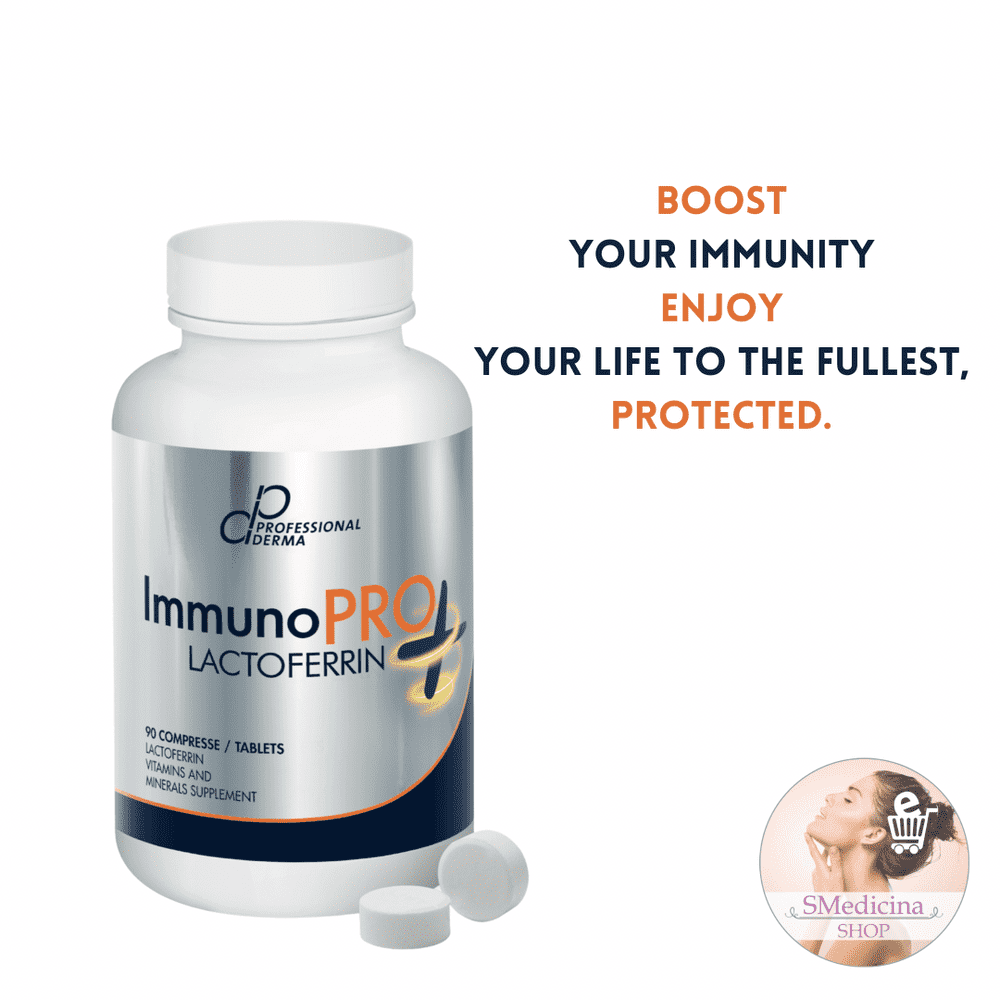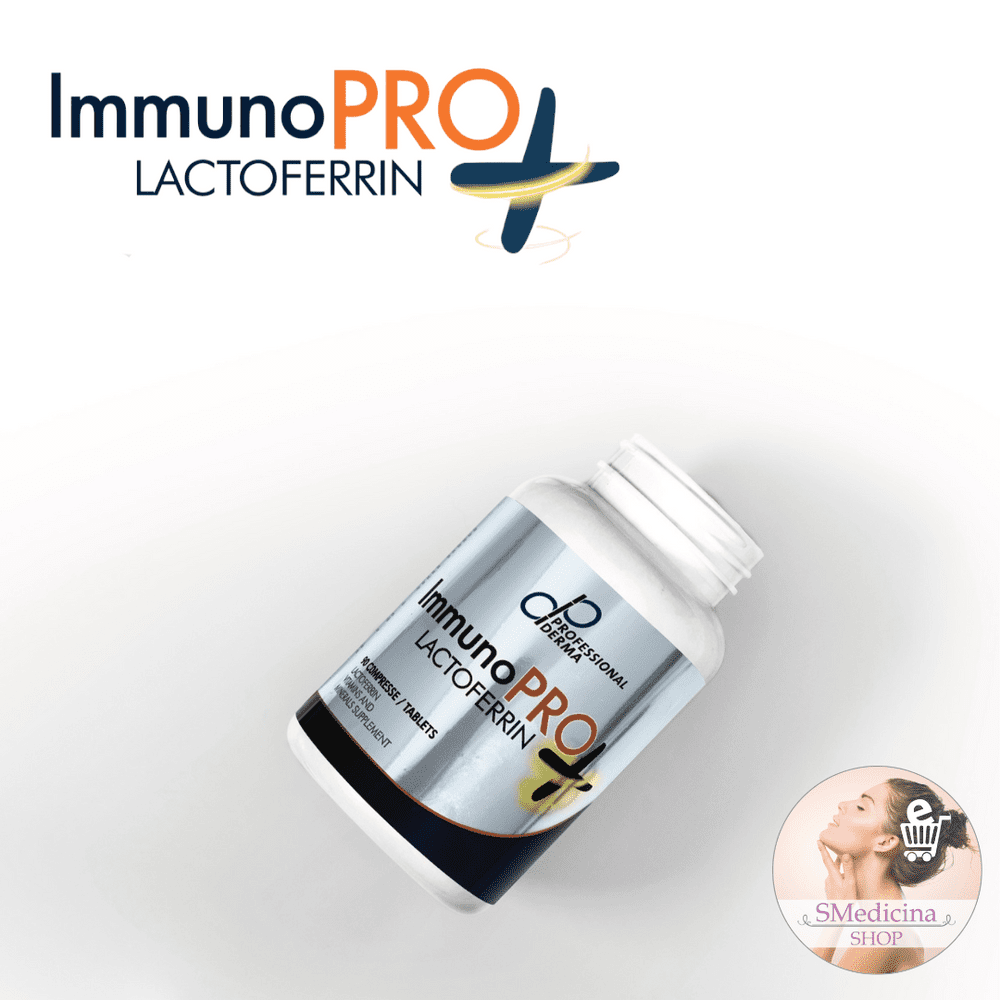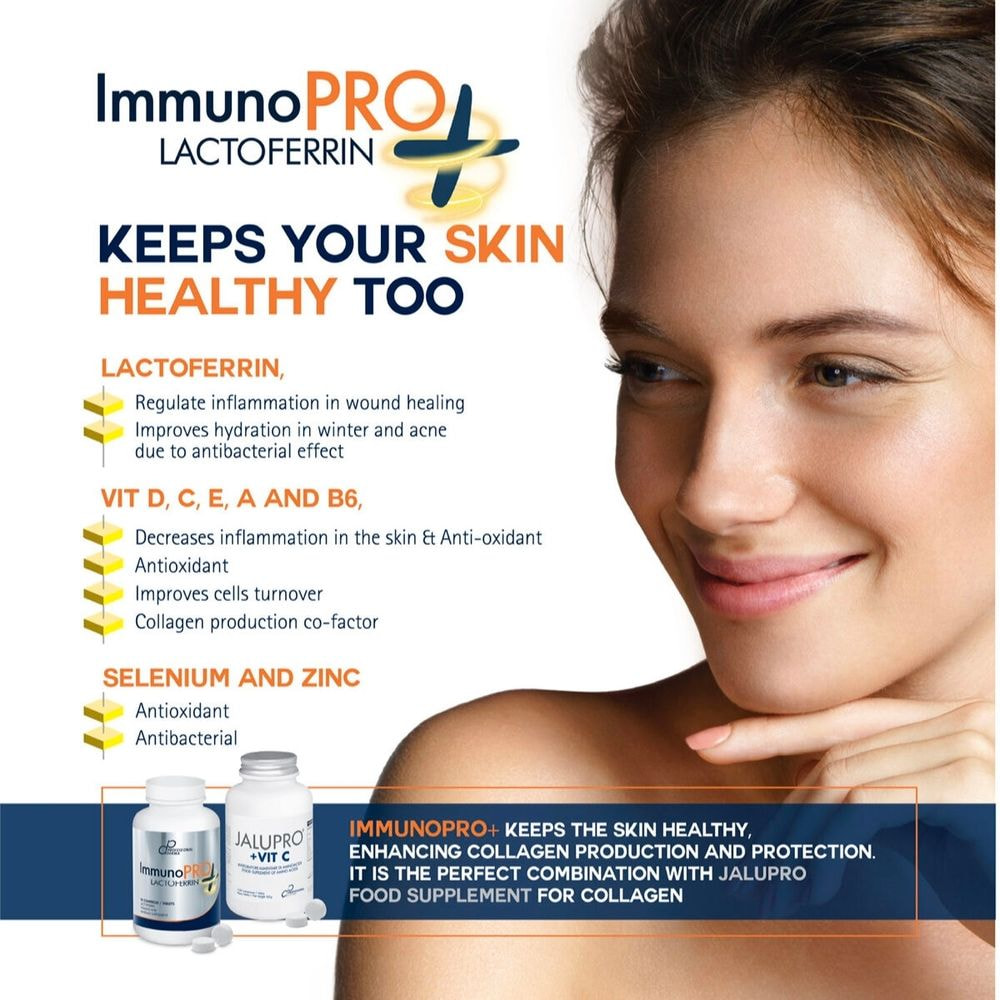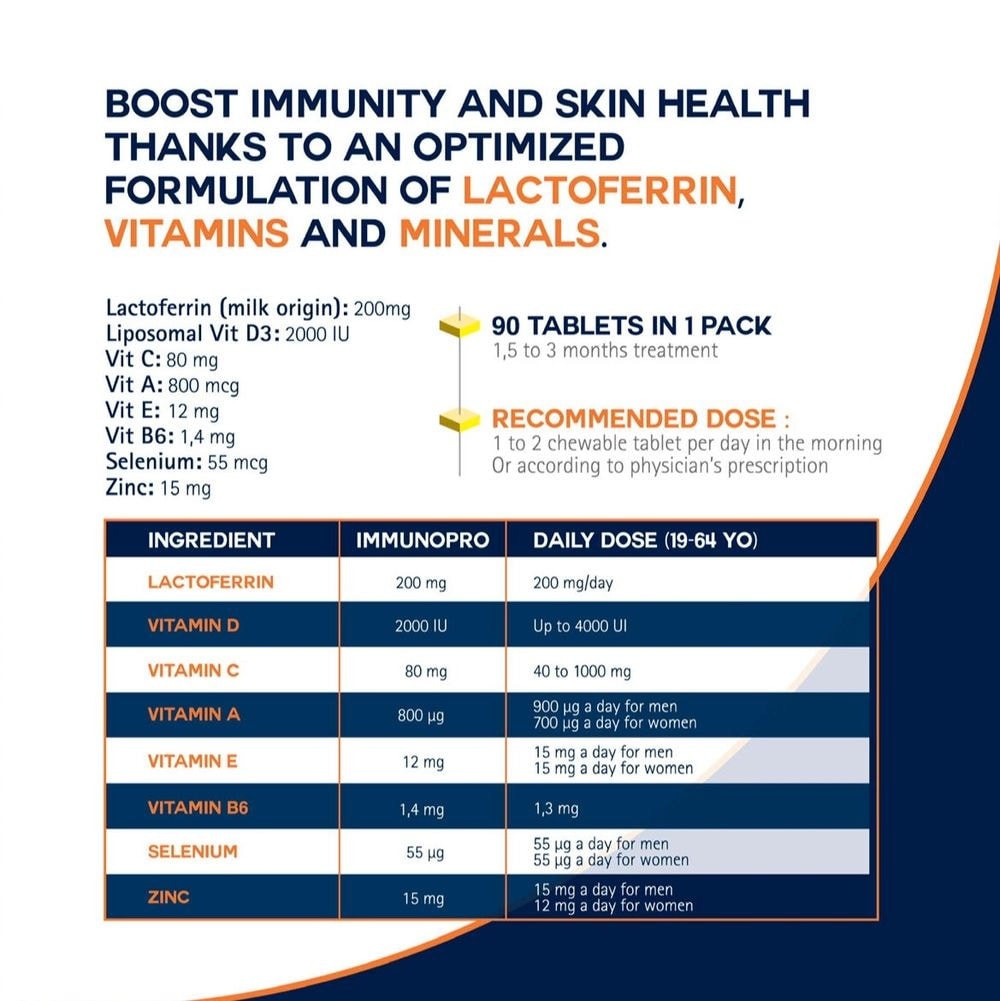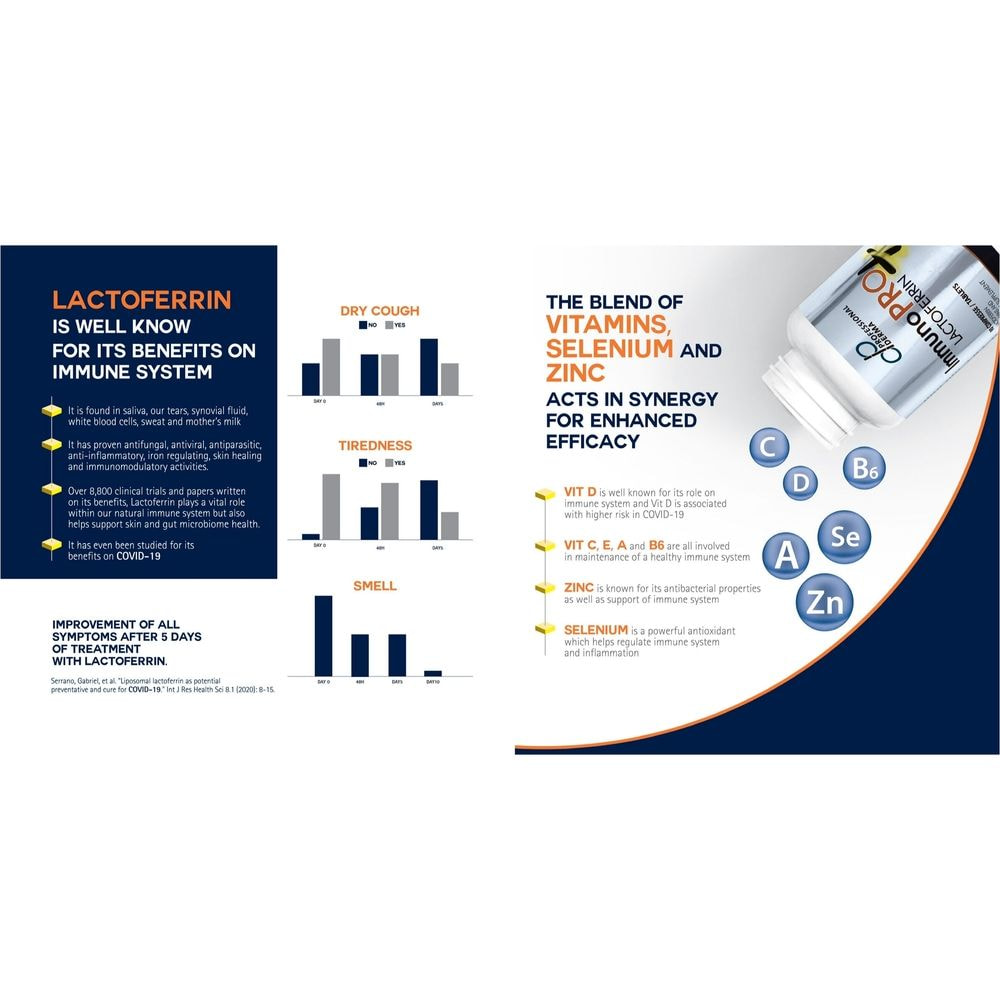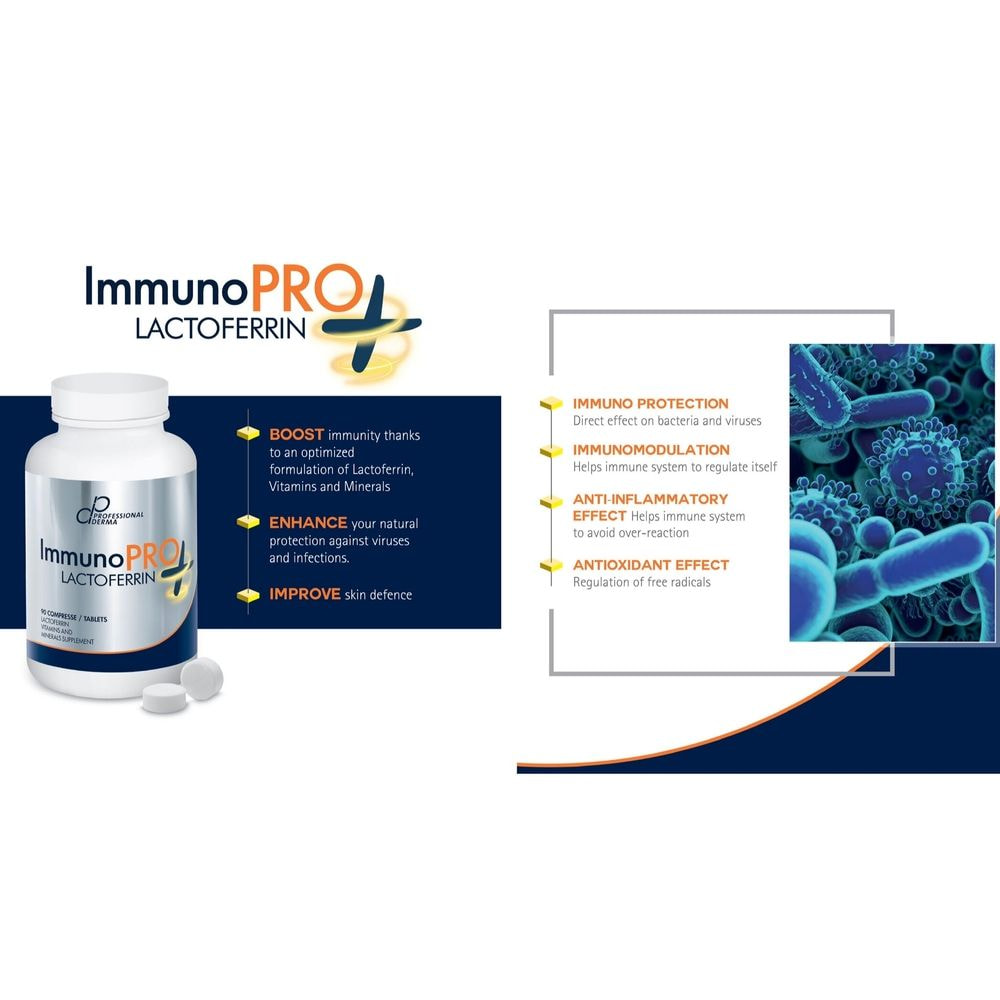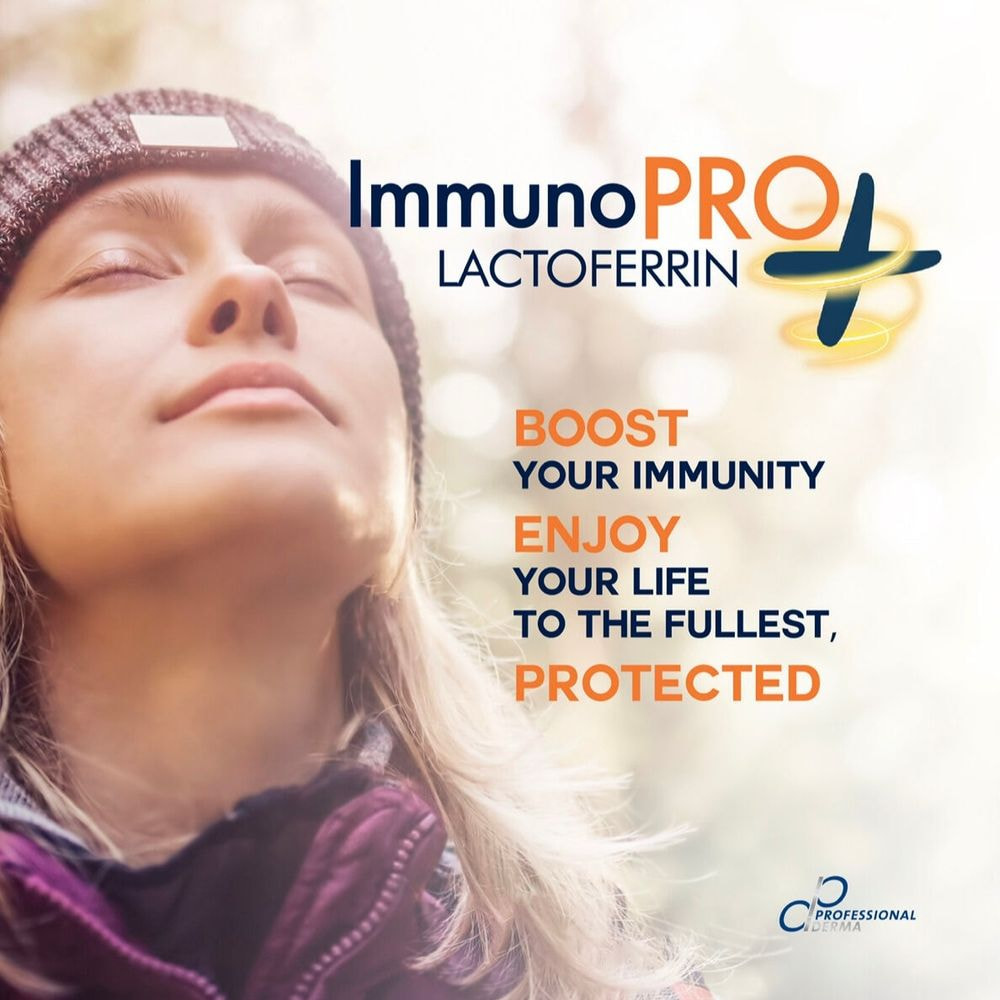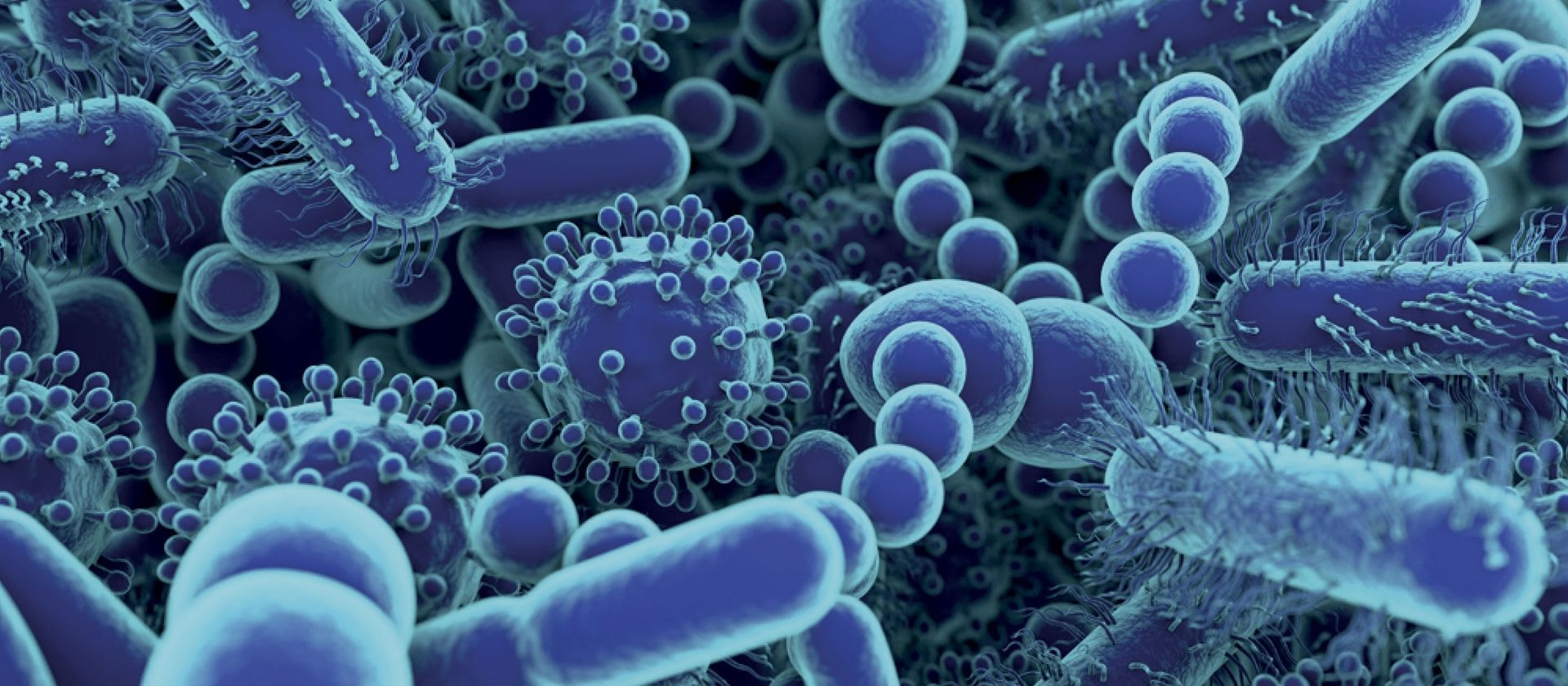
Immuno PRO Lactoferrin
Boost immunity thanks to an optimized formulation of Lactoferrin, Vitamins and Minerals.
Enhance your natural protection against viruses and infections
Improve skin defence.
An optimal formulation for enhanced protection for health
| Lactoferrin Vitamin D Vitamin A Vitamin B6 Zinc |
Direct immuno protection |
|
Vitamin C |
Reactive Oxygen Species regulation (generation and absorption) |
An optimal formulation for enhanced protection of skin
|
Lactoferrin |
Skin cells signaling (proliferation) |
COMPOSITION
- Lactoferrin (milk origin) : 200mg
- Liposomal Vit D3 : 2000 IU
- Vit C : 80 mg
- Vit A : 800 mcg
- Vit E : 12 mg
- Vit B6 : 1,4 mg
- Zinc : 15 mg
- Selenium : 55 mcg
90 tablets in 1 pack → Up to 3 months treatment
Recommended dose: 1 tablet per day or according to physician’s prescription
Recommended doses:
|
Ingredient |
Immuno Pro |
Daily dose (19-64 yo) |
comments |
|
LACTOFERRIN |
200mg |
200mg/day |
Could be higher in case of established infection |
|
VITAMIN D |
2000 IU |
Up to 4000 UI |
Can vary according to your age, condition, genetic |
|
VITAMIN C |
80mg |
40 to 1000 mg |
Could be higher in case of increased metabolic needs (infections, smoking…) |
|
VITAMIN A |
800 µg |
900 µg a day for men 700 µg a day for women |
Overdose of Vit A (1,5g) can lead to osteoporosis |
|
Vitamin B6 |
1,4 mg |
1,3– 1,5 mg a day |
Tolerable upper intake is 100 mg for an adult |
|
VITAMIN E |
12 mg |
15mg a day for men 15mg a day for women |
Overdose is not documented but too much of some anti-oxydant and turn into pro-oxydation |
|
SELENIUM |
55μg |
55μg a day for men 55μg a day for women |
Overdose can cause loss of hair and nails |
|
ZINC |
15 mg |
15mg a day for men 12mg a day for women |
Overdose reduces the amount of copper the body can absorb and can lead to anaemia and weakening of the bones. |
LACTOFERRIN
- Lactoferrin is a natural iron-binding glycoprotein
- It is found in saliva, our tears, synovial fluid, white blood cells, sweat and mother’s milk
- It has proven antifungal, antiviral, antiparasitic, anti-inflammatory, iron regulating, skin healing and immunomodulatory activities.
- Over 8,800 clinical trials and papers written on its benefits, Lactoferrin plays a vital role within our natural immune system but also helps support skin and gut microbiome health.
How does it work?
- Lactoferrin helps regulate how well iron is absorbed into the body from the intestine
- It binds as well Iron in the blood preventing it to be used by bacteria for their growth and virulence
- It inhibits the entry of viral particles into host cells, either by direct attachment or by blocking their cellular receptors
- It enhances natural killer cell activity and stimulates neutrophil aggregation and adhesion in immune defence
- It has an immunomodulatory effect with cytokine regulation and anti-inflammatory properties (reduces IL-6 and TNF-⍺)
- Increase the expression of Vit D receptors
LACTOFERRIN AND COVID
- There has been a renewed interest in LF for prevention and treatment adjuvant for COVID-19 in regard to its anti-binding properties.
- Many in vitro studies and some in vivo studies have been conducted with positive results
- As a well known and safe supplement, it is a good candidate as a preventive and potentially adjuvant treatment of COVID-19
- Lactoferrin and Vit D combined supplementation may represent a valid adjuvant therapeutic tool in patients with Covid-19 in light of their well-known anti-inflammatory and immunomodulatory properties.
- Prospective observational study
- 75 patients with typical symptoms of COVID-19 who tested positive on antigenic test
- Group 1: LF (128-192 mg/day) + Vit C (48-72mg) + Zn (20mg)
- Group 2: LF (256 to 384mg/day)
- Treatment duration 10 days
- Treatment dose:
- 64-96 mg every 6 h daily to cure COVID-19 (256-384 mg/d).
- Doses can be increased to 128 mg every 6 h (512 mg) if needed.
- Preventive dose:
- 64 mg two to three times daily can prevent COVID-19 (128-192 mg/d).
- Special population:
- Pregnant women and infants under the age of two. - Mothers: 64 mg (20 ml) twice a day (128 mg/d).
- Infants: 32 mg (10 ml) twice daily.
- Most symptoms improved significantly during first five days.
- At the moment of closing the present paper, Chang et al. empirically proposed the use of nutritional supplements of LF and commented that LF show antiviral efficacy against a wide range of virus including SARS-CoV, a closely related corona virus to SARS-COV-2 (COVID-19) and also possesses significant immunomodulatory and anti-inflammatory properties which might be of relevance to the pathogenesis of severe COVID-19 cases. Our clinical trial confirmed their assumption and elucidate the potential doses for prevention and treatment of COVID-19 infection.
VIT D PROPERTIES
- Vit D is well known for its role in calcium uptake and fixation in bones
- It is as well a key modulator of innate immunity and natural defense from acute viral respiratory infections
- COVID-19 has shown that deficiency in Vit D represent a risk factor for disease severity
- Vit D deficiency represents a global pandemic afflicting more than a billion individuals across all age group worldwide (indoor lifestyle, lack of sun in northern hemisphere, genetic predisposition)
- Deficit in Vit D is a risk factor for Severe COVID
- Role of VitD on immunity is known for years
VITAMIN C
- Vitamin C is know for year to help fight viruses infection (it is the treatment for Epstein-Barr virus infection)
- It is essential for recovery from damage caused by viral or bacterial infections, as well as for the normal functioning of the brain and many essential biochemical pathways.
- It is the main systemic extracellular antioxidant
- Prevents toxicity from ROS and viruses.
- When oxidized through donating an electron to reduce an ROS, it can be regenerated through a variety of mechanisms, including reducing enzymes and other antioxidants.
- Vitamin C can support intracellular antioxidants such as GSH (glutathione) and catalase when the load of ROS is severe.
- Vitamin C also empowers the immune system, promoting chemotaxis, growth, and activity of some immune cells (macrophages, lymphocytes, natural killer cells) allowing the body to more effectively fight an infection.
- Vitamin C has many other roles
- co-factor for collagen production
- absorption of iron,
- metabolism of many essential biochemicals including carnitine and neurotransmitters (e.g. norepinephrine, serotonin).
VITAMIN E
- Supports immune system
- Vitamin E supports the growth of T cells.
- Vitamin E modulates T cell function through directly impact (membrane integrity, signal transduction, and cell division)
- Vitamin E regulates inflammatory mediators generated from other immune cells.
- Acts as an antioxidant and prevent damages from infection
- Vitamin E reduces cells damage
VITAMIN A
- Vitamin A is a micronutrient that is crucial for maintaining vision, promoting growth and development, and protecting epithelium and mucus integrity in the body.
- It is known as an anti-inflammation vitamin because of its critical role in enhancing immune function.
- It is involved in the development of the immune system and plays regulatory roles in cellular immune responses and humoral immune processes.
- It has demonstrated a therapeutic effect in the treatment of various infectious diseases.
- Vitamin A deficiency
- impairs normal regeneration of mucosal barriers damaged by infection,
- diminishes the function of neutrophils, macrophages, and natural killer cells.
- diminishes antibody-mediated responses directed by Th1 and Th2 cells
ZINC
- There are a number of ways zinc supports the immune system but primarily it activates enzymes that break down proteins in viruses and bacteria so they are less able to spread.
- It also increases the activation of cells responsible for fighting infection.
- It helps cells destroy microbes such as E. coli by overloading them, this poisoning them to kill them off.
- It reduces ‘oxidative stress and damage to DNA’ that helps protect against chronic diseases.
- It reduces inflammation in the body.
- zinc is ‘lured’ into cells that fight infection, to help stop the immune system spiralling out of control.
- if there wasn’t enough zinc to support this response, then excess inflammation is triggered – potentially damaging cells and the body.
SELENIUM
- Selenium is a powerful antioxidant
- Selenium interferes with oxidative stress and thereby plays an important role in the regulation of the immune system and inflammatory processes.
- Selenium deficiency is common among most immunocompromised patients and may explain increased vulnerability of these patients to viral and bacterial infections.
Error
Manage permissions
Decide which cookies you want to allow.
You can change these settings at any time, but please note that this can result in some functions no longer being available. For information on deleting cookies, please consult your browser help function.


